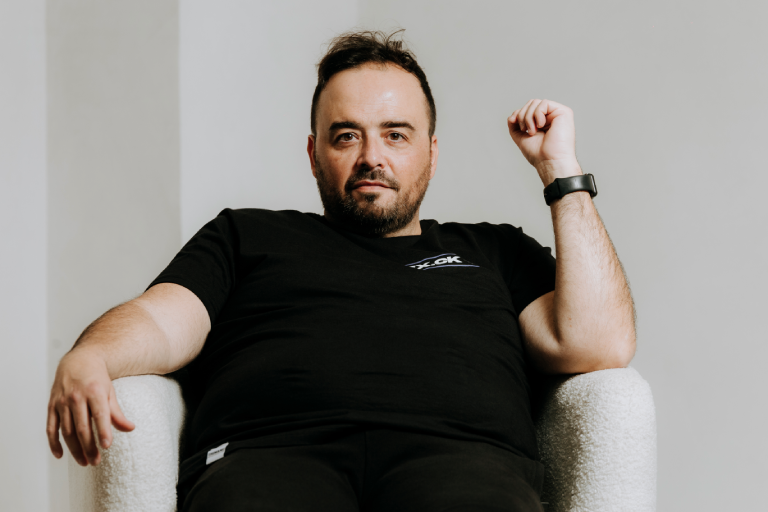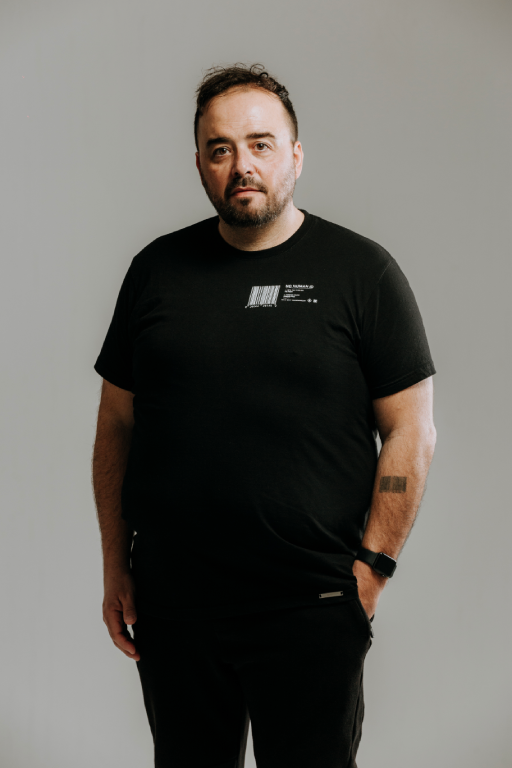LIVE
FERNANDO LAGRECA
Fernando, it’s a pleasure to have you as part of our space. Tell our audience about yourself. Besides being a DJ and producer, you are also part of the Miracle Management agency. How have you managed to position yourself in the international scene?
Hello everyone! The pleasure is mine; I’ve been following you for a while, so it’s great to be here with you today. For those who don’t know me, I’m originally from Montevideo, and I’ve been living in Barcelona since late 2002. In Montevideo, I was involved in various projects during the ’90s, some more related to pop or rock bands, and at the same time, I’ve been creating electronic music for as long as I can remember. It was a time of a lot of experimentation, playing with very few elements since it was very difficult to access technology, instruments, etc., partly because there wasn’t much available in Uruguay, and what was available was very expensive—it was truly an adventure. But Uruguayans have always been resourceful and clever :) and the path was made. In the mid-’90s, with a group of friends, we formed an electronic art collective (Innova), with which we performed in many places, not just clubs, but also seeking out more ‘special’ places like museums, beaches, art galleries, theaters, etc.—places where, at least in Uruguay, electronic music hadn’t entered yet. As I mentioned before, at the end of 2002, I settled in Barcelona, where I began organizing small events in Cultural Centers related to electronic art, noise, sound art, experimental music, because when I arrived here, the music that was being played wasn’t the same as what you heard in the clubs in Montevideo and Buenos Aires, where there was more progressive music, even more trance-like sounds, etc. Here in Spain, it was either very house or very techno, but not the same techno I liked to listen to in the ’90s. It was very fast, very mechanical techno here in Spain, and it didn’t quite resonate with me, so it was a bit difficult for me to adapt artistically at the beginning. So, since I had quite a few contacts related to more experimental styles, which was something I always really liked, I developed in that direction. After a while, being more integrated into the scene, and with the advent of Minimal, I found a sound that made me feel comfortable, and I returned to a period closer to the dance floor. Later on, I got involved in the more business side of the industry, not just the artistic side, as I wanted to find a way of life related to culture and music, not only as a producer. I’ve always been interested in the business side. In Montevideo, I studied Business Administration, had a couple of postgraduate degrees as well, and here I did a couple of Masters and studied languages to have a more complete professional profile, and that brought me closer to the ‘agency’ side. I started working with the founder of Miracle (Jaume Pagès), and after some time, he wanted to step back from the agency in an active role, and I took over as general manager of Miracle. Positioning yourself in a scene or sector involves making connections, networking, dedicating time, not giving up, pursuing that idea, and working hard. It takes patience, learning a lot day by day, staying informed, and treating it as a long-term career—something that will take time.

What made you lean towards the live format rather than the typical DJ set format with CDJs or vinyl?
I guess I had so many DJ friends in Montevideo that I wanted to do something different. That’s one part of it. The other part is that I’ve always been a huge synth freak—grooveboxes, drum machines, pedals, etc. All of that always attracted me much more than playing music as a DJ. I’d say it was a natural process; I always opted to improvise, to play live, etc. Although now, with the enormous technological possibilities, I’m doing a lot of DJ sets or hybrid DJ sets where I combine 2 x CDJs with some instrument, like the MPC One or the Elektron Syntakt. I find it really fun to ‘intervene’ in other producers’ tracks live, making a sort of ‘ephemeral remix on the fly,’ something like that. I want to delve deeper into this ‘hybrid’ phase in terms of dance music, and at the same time, I want to increasingly dedicate my ‘live’ sets to other types of situations. For example, I’m currently finishing an album that is set to be released in November this year, and it’s not a techno album; it’s electronic and somewhat pop. So in that case, I’d really like to perform it live. But right now, I’m rediscovering this hybrid DJ facet, and I’m really enjoying it :)
How do you consider your career has evolved over the years?
Honestly, I always see myself in constant evolution and change. I started in Spain doing more experimental things, then went through a more pop phase (where I released a couple of albums with guitar and vocoder), then moved into more Minimal stuff, then back to lo-fi, new wave, and chillwave territories. For the past few years, I’ve been more on the dance music side again. Even my 2020 album (which was very well received by critics and the press but, due to the pandemic, I could only perform live a few times) has a very eclectic journey; there’s techno, drum’n bass, urban music, hip hop, and even ambient… So I’m very restless musically; I don’t usually stick to any particular style, although I’m aware that many people know me for my live hardware sets—without a laptop, dance floor-oriented, techno, etc. But I also have that side of composing music for listening or more pop-oriented stuff.
What I love most about this musical journey, aside from obviously being able to experiment with a lot of sounds, synths, plugins, effects, etc., is the opportunity to travel with my music to different places. Fortunately, I’ve had the chance to perform in many countries across various continents, and to be part of top events like Sonar or ADE, as well as in different festivals, venues, and clubs of international renown. I’ve met many artists, promoters, bookers, managers, etc. I see my evolution as part of a whole in which the core is music as a concept or art, and from there, I move across different levels. I’ve also developed a solid career as an expert in the music industry, which has allowed me to give masterclasses and lessons at universities, academies, etc. (I’m a professor at SAE in Music Business and Hardware Synths), and that’s a facet I really enjoy too—meeting emerging talent, supporting new creators with knowledge, and sharing what I’ve learned over the years. But my plan is to keep evolving, without stopping :)

Do you think the evolution of techno has been positive or negative over the years?
I would say it has been completely positive, for many reasons. On one hand, it has given significant recognition to a lot of ’90s techno that had been largely forgotten, and having a musical movement that respects and honors its origins is something I find quite good. On the other hand, attracting young people to the dance floors and festivals is always a positive thing, especially considering the disaster that the pandemic was for events, etc., and the fact that this spirit of dance has been able to recover is always welcome.
Of course, to reach this ‘sweet spot’ of techno, there has also been a need to revalue a harder or more rave-oriented sound, which also brings with it a somewhat ‘commercial’ aspect, in that the new hard techno circulating now sometimes incorporates elements from other more mainstream genres, like certain flirtations with EDM or a rougher rave vibe that doesn’t really align with the rave spirit of the ’90s. I’m not a purist at all—I have my tastes and preferences like anyone else—and I believe that this new resurgence of techno has also brought an attempt at fusion or breaking down barriers. Nowadays, many people who go to techno festivals might listen to totally commercial music at home or in their car during the week. If we were to look at the Spotify playlists of most festival-goers, we’d probably find a bit of everything… Back in the ’90s and ’00s, it was much more compartmentalized, much more rigid, and as such, it wasn’t likely to last. The fact that it’s done without so many barriers—after all, it’s all about dance—and what people want is to have fun and dance. Rhythm is innate, so if techno makes it easy, it will ultimately be for the better.
At the same time, this resurgence has led to other rhythms in general increasing their BPM, like the new house music, which is gaining a lot of traction—it’s a pretty fast-paced house, and the same goes for other rhythms and styles. In short, I think it’s all good! Even though I’m not a fan of hard techno or other sounds over 140-145 BPM unless it’s drum’n bass :)
What do you think is the most difficult task when it comes to being an artist booker?
Good question, since being a booker-manager-entrepreneur is like being on a rollercoaster all the time, especially when balancing it with my artistic side, etc., all within a rather—or very—unstable sector. Perhaps one of the most challenging aspects of representing artistic profiles is knowing how to manage expectations or at least trying to. Artists want bookings, they ask for services, promoters want the best artists at the best price—everyone has demands. As a representative, you essentially have a ‘dual client.’ The artists you represent are clients of the agency in a way, although, of course, we’re dealing with sensitive material—people, artists. On the other hand, promoters or festivals and their programmers are also clients, more like a ‘typical’ client you’d find in any business situation.
In the middle of it all are the agencies and bookers, trying to secure good bookings for our artists, maintain a competitive roster, and also keep a good relationship with promoters and festivals. This involves managing fee expectations, helping ensure everything goes smoothly logistically, overseeing everything, etc. It’s like constantly managing very delicate balances to make sure the artist gets what they deserve, playing with the right promoters in each case, on the most favorable lineups, while also taking care of the promoter, etc. It’s a constant puzzle :)
If you want to add anything else, what would it be?
Just to thank you for the opportunity, for the questions, and also for letting me share my music. I’m leaving you with a set I just recorded, in a hybrid format, with 2 x CDJs and an MPC One. I had a lot of fun recording it, so I hope you enjoy it. Best regards!
I also want to thank the entire Fusión team for this invitation and the space to share my work. See you soon!